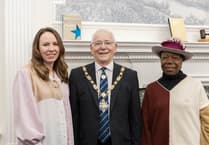ST Peter’s C of E Primary School in Farnham has officially launched its newly installed public access defibrillator, which was funded by the British Heart Foundation and with money raised by the school PTFA.
The school decided to gift the defibrillator to their community, after resident Henry Neal sadly died from a cardiac arrest in January this year, close to the school.
Melanie Lawton, chairman of the PTFA, said: “We were already raising money for a defibrillator for our own use but when this happened, we spoke to the head and she agreed that we could put it outside on the gates, so it is available to the whole community, 24/7”.
The school then applied to the British Heart Foundation for a grant towards the cost of the defibrillator itself, and undertook fundraising for the balance and for the installation of the bright yellow, temperature controlled cabinet to house the machine. This cabinet is unlocked and can be accessed at any time.
The school hosted an awareness event for members of the community to learn about the defibrillator, prior to the official launch outside. Joining the governors and headteacher Sarah Dunning was the Mayor of Farnham, Pat Frost, as well as representatives from the ambulance service, the Heartstart scheme and community group the Farnham Lions.
Also in attendance at the launch were Mr Neal’s family, alongside Alison Beardsall and Colin Craven – the two neighbours who provided CPR to Mr Neal before the emergency services arrived.
St Peter’s commits to regularly teaching its pupils emergency life support skills. Year Five and Six receive annual CPR training, organised by Heartstart Farnham Lions and delivered by the South East Coast Ambulance Service.
For a relatively small school community, there is a huge amount of experience within it to show the importance of learning these skills. Also attending the launch were two mums from the school, who have both administered successful CPR to strangers in the street.
Joanna Michaelides, the BHF Heartstart trainer and school mum who spearheaded the project for the PTFA, said: “I hope more places will consider installing a public access defibrillator. Defibrillators deliver a controlled electrical shock to the heart after a cardiac arrest, which can allow the heart to re-start. Public Access Defibrillators are fully automated, require no training and can be used by anyone. They can dramatically increase the odds for survival. Let’s give our communities every chance.”
For more information go to the websiste www.bhf.org.uk/heart-health/nation-of-lifesavers/about-defibrillators/applying-for-a-defibrillator or www.heartstartfarnhamlions.co.uk.




